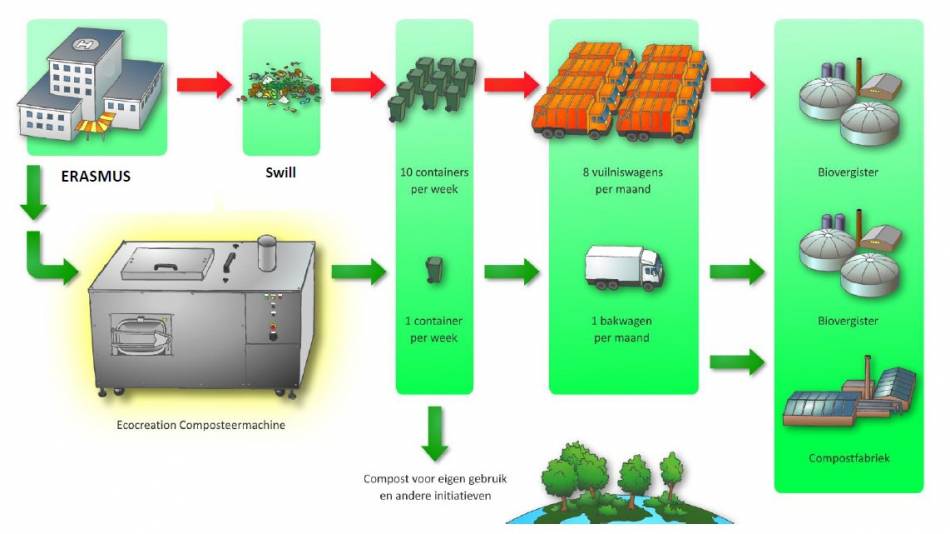New composting machine at Erasmus University Rotterdam
Source: Erasmus University Rotterdam. (2022, 14 April). New composter offers sustainable solution, from https://www.eur.nl/nieuws/nieuwe-composteermachine-biedt-duurzame-oplossing
Banana peels, coffee grounds, pizza crusts, leftover hairdressing salon food, wrinkled tomatoes... From this week on, a motley collection of food waste ends up in the EUR's brand new composting machine. The machine quickly converts organic waste into nutritious compost. With this sustainable addition, the EUR takes a step towards reducing CO2 emissions.
How does the composter work?
The composter was made in the Netherlands, by the Dutch company Ecocreation. It is a product that is energy-efficient and easy to use. The machine is replenished every working day with organic waste from the food court, the pavilion and other university buildings. So when you dispose of your banana peel in the food waste bin, it now goes into the composting machine. The machine can process about 280 kg of waste per day and within 24 hours it converts it into compost. This is done by means of a natural process.
The machine contains a culture of bacteria, which are activated by the presence of oxygen, heat and food. The organic waste serves as food for the bacteria. The composting machine heats the waste slightly and scoops it up regularly, thus adding oxygen. This makes the bacteria active and they convert the waste into a valuable organic substance, or compost. Fans ensure that any moisture released is removed. A simple but effective system!
Less waste = less emissions
Thanks to the composting machine, waste can be reused as compost (e.g. in the campus garden), but there is another important benefit for the EUR. The composting machine reduces the volume and weight of waste by no less than 85 percent! Organic waste consists largely of water. The machine removes this water, making the waste much more compact.
The arrival of the composter reduces the EUR's CO2 emissions and saves on waste disposal costs. In this way, the composter contributes to the EUR's sustainability goals and to our ambition to become one of the most sustainable universities in the Netherlands.
Composting is already underway
This week, the composting machine was put into operation for the first time. So the first containers of organic waste have already been processed! Behind the scenes, the Real Estate & Facilities department has been working hard recently to steer the arrival of the composting machine in the right direction. For example, they have looked into how the waste flows on the campus should be organised and managed in order to make optimal use of the machine. The disposal and reuse of the compost have also been arranged.

What you will notice on the campus
You can admire the composting machine at the containers next to Sanders Building, under a canopy of recycled materials. The machine only blows warm, moist air and is therefore not harmful to the environment. Afraid that you will hear or smell the machine before you see it? That's not necessary, as the composting machine produces little noise and the smell is negligible. In fact, it is mainly the waste containers around the machine that sometimes smell. With the arrival of the machine, fewer waste containers are needed. Moreover, the machine is well sealed, so there is less nuisance from vermin. In other words, there are only advantages.
You can learn to compost
Did you know that you can easily make compost at home? Egg shells, coffee grounds and banana peels, for example, make a golden trio that is a great help to your plants. This is what you need to make a nutrient-rich smoothie for your plants:
Mix everything in a blender and store the mixture in a sealed bottle. The blended goodness doesn't look like much, but it will give your (indoor and outdoor) plants a big boost. Pour two tablespoons on the soil every now and then and your plants will thank you! Banana peels contain potassium, coffee grounds are full of minerals and egg shells are bursting with calcium. Bonus: The caffeine in the coffee grounds repels slugs, which eat your plants.

